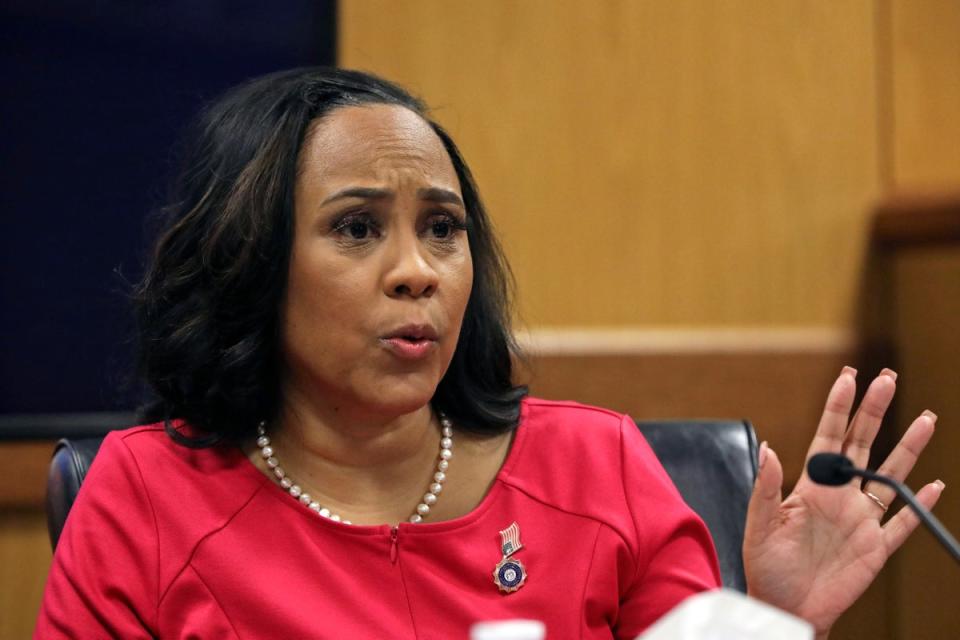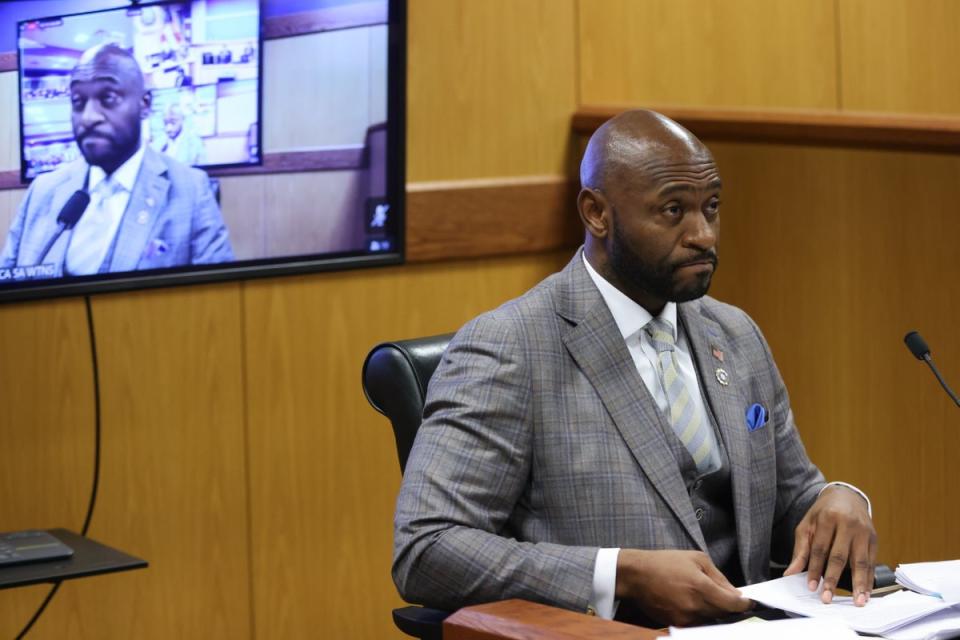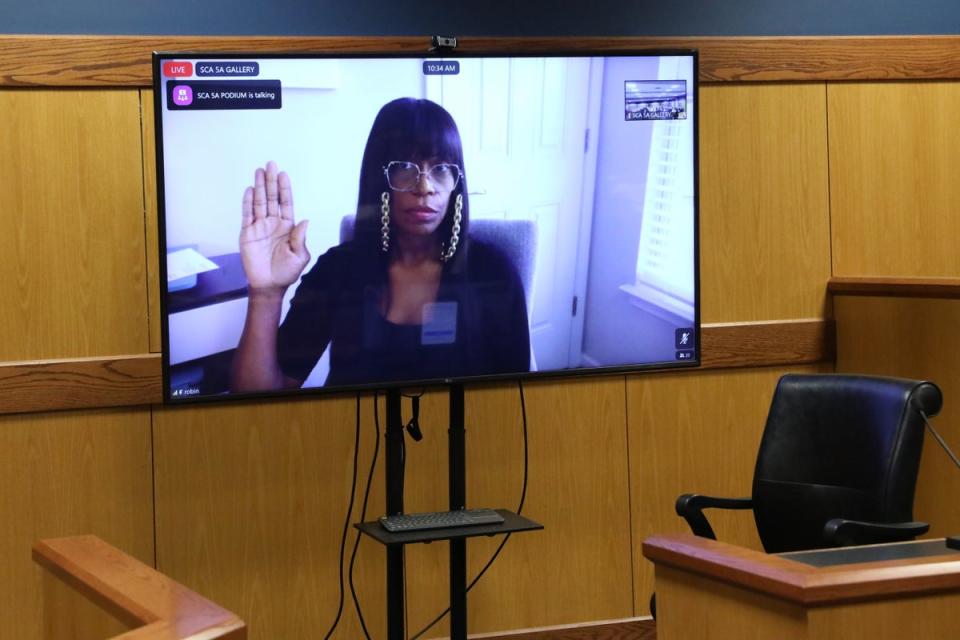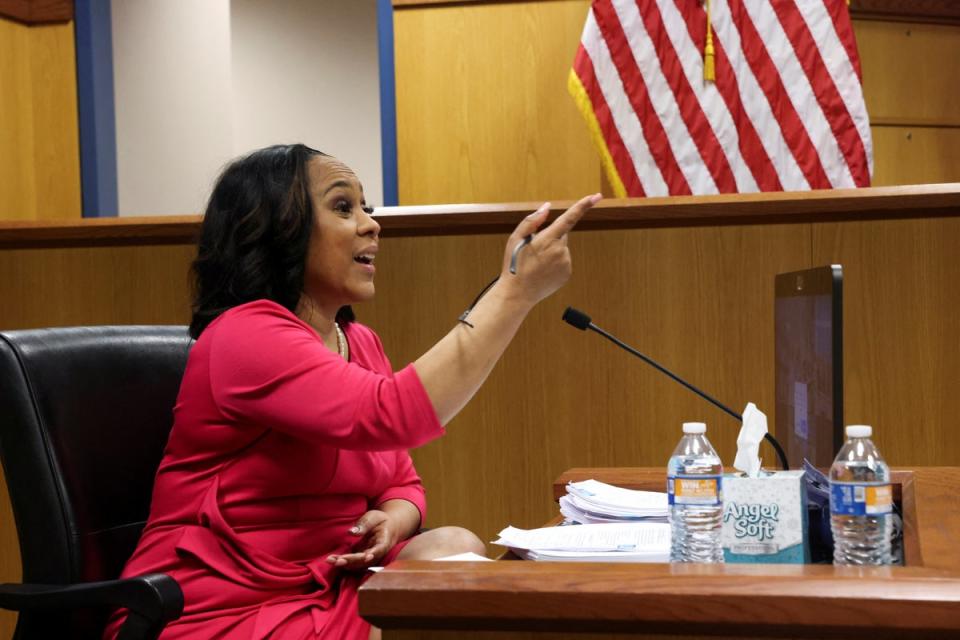Cash, objections and overseas trips: Key revelations from Trump prosecutor Fani Willis’ hearing
- Oops!Something went wrong.Please try again later.
- Oops!Something went wrong.Please try again later.
A misconduct hearing is underway in an Atlanta courtroom where the future of Fulton County District Attorney Fani Willis’ role in the Georgia election interference case against former president Donald Trump is being determined.
The defence has scrutinised the timeline of the relationship between Ms Willis and the special prosecutor she hired, Nathan Wade. The pair have not disputed the relationship, but defence attorneys for the former president allege that the elected district attorney abused her office by financially benefiting from the case by hring a romantic partner.
Hearings on Thursday and Friday revealed intimate details of their current and former relationships, which Mr Wade described as “private but not a secret,” as well as the friendship between Ms Willis and a former employee in her office.
Fulton County Superior Court Judge Scott McAfee has said that Ms Willis and her team could be disqualified if the allegations are substantiated, which would then trigger a re-appointment process that could continue to delay a major criminal case against the former president.
Here are some key revelations from the two-day hearing:
Relationship timeline
Nathan Wade wrote in a sworn affidavit that he did not start a romantic relationship with Ms Willis until 2022. He supported this claim in his testimony on Thursday, adding that his their relationship began in March 2022.
Ms Willis, when she testified, said their relationship began in “early 2022,” which she then estimated as April 2022.
These testimonies suggest that they started dating after Mr Wade was hired by Ms Willis in November 2021.

Robin Bryant-Yeartie, who first testified on Thursday, told the court that she believed the pair began dating in November 2019, not long after the pair met at a municipal court judges conference in October.
Mr Wade revealed that the pair are not still together romantically, as of June 2023, but remain good friends.
When Ms Willis was asked when they stopped dating she replied that “he’s a man. I’m betting he would say June or July,” when they were no longer “physical”. Ms Willis testified that they had a “tough conversation” and ended the relationship in August of last year, before the indictment against Mr Trump and his co-defendants.
She added that their relationship’s end had “nothing to do” with the indictment.

Friendship between Ms Willis and Ms Bryant-Yeartie
Ms Bryant-Yeartie told the court that she first met Ms Willis in college in 1990.
She aid she last spoke to Willis in March 2022. They were good friends and later worked together at the DA’s office.
In her testimony, Ms Willis had a totally different take on their relationship. She said they partied together while they were both in college — although they attended different schools in different states.
“I haven’t spoken to her in over a year. I certainly do not consider her a friend now... I think that she betrayed our friendship,” Ms Willlis said.
Ms Bryant-Yeartie also said that Ms Willis leased a condo she owned in April 2021, adding that Ms Willis took over her lease after moving out from her house in South Fulton shortly after she faced death threats upon her election to office.
“I never lived with her,” Ms Bryant-Yeartie said.
Ms Willis also agreed with the timeline, but took issue with how Ms Bryant-Yeartie portrayed the circumstances in which Ms Willis rented her condo. “That’s a lie,” she said.
Ms Willis said that she chose to move to the condo because her father was “terribly concerned” and urged her to leave her house due to the threats the familiy receieved.

Cash payments
Ms Willis testified that she often paid in cash and had reimbursed Mr Wade for trips that the couple went on — a disclosure that also seemingly poked holes in the defence’s questioning of Mr Wade’s financial statements.
During Mr Wade’s testimony, the prosecutor was asked about all of the charges on his Capital One card, which seem to suggest that he had paid for a series of trips with Ms Willis to Belize, Aruba and elsewhere.
Mr Wade explained to the court that he booked a lot of these trips for “safety reasons,” given the high-profile nature of the election fraud case against Mr Trump, and that she paid him back in cash.
Ms Willis explained that her father once told her she should always have six months of cash stored in her house or “wherever I lay my head.”
Mr Wade testified that she always reimbursed him: “She’s a very independent, proud woman so she’s going to insist she carries her own weight ... She’s going to pay her own way.”
“I dont need anybody to foot my bills,” Ms Willis said.
Ms Willis eager to clarify the allegations against her, the timeline of her relationship, and how she handled payments for trips and meals between them, and how the relationship ultimately came to an end.
“He told me one time: the only thing a woman can do for me is make me a sandwich,” she said. “We would have brutal arguments about the fact that he was my equal … There was tension, always, in our relationship … I don’t need anything from a man. A man is not a plan. A man is a companion.”
On Friday, defence attorneys also questioned Ms Willis’s father John Clifford Floyd III about his daughter’s use of cash, prompting Mr Floyd – who is Black – to deliver a history lesson about racist discrimination and to defend a habit that he taught his daughter.
“I’m not trying to be racist but it’s a Black thing,” he said. “Most Black folks they hide cash or keep cash … You always keep some cash.”
He explained that a restaurant rejected his credit cards and traveller’s cheques while he was a fellow at Harvard University, “just because of the colour of my skin.”
“I told my daughter, ‘You keep six months of cash, always,” he said. “I gave my daughter her first cash box and told her always keep some cash.”
Fani Willis’ fiery testimony
Ms Willis did not seem to hold back any emotion at the hearing, evident from the moment she burst into the court.
“I’m ready to go,” Ms Willis announced as she entered the courtroom on Thursday. She testified that she ran to the courtroom after she heard Mr Wade’s testimony had ended because she thought she would be called next to the stand.
“I’ve been very anxious to have this conversation with you today,” Ms Willis told defence attorney Ashleigh Merchant. “It’s ridiculous that you lied on Monday and yet here we are. ... I’m actually surprised that the hearing continued. But since it did, here I am.”
After Ms Willis explained her money habits, Ms Merchant suggested that Ms Willis “doesn’t know where that cash came from” when she reimbursed Mr Wade for various trips.
“You are mischaracterizing my testimony greatly,” Ms Willis said. She added the money “came from my sweat and tears.”
She accused Ms Merchant of repeatedly mischaracterising her testimony and repeating “lies” about her personal life in her questions to Ms Willis and in court filings.
“You’re confused. You think I’m on trial. These people are on trial for trying to steal an election in 2020,” she said. “I’m not on trial. No matter how hard you try to put me on trial.”

Up close and personal
The lines of questioning from attorneys for Mr Trump and his co-defendants often veered into deeply personal questions, with Ms Willis eager to clarify the allegations against her in her heated testimony.
Ms Willis said she found it “highly offensive” that the lawyer implied that Ms Willis had slept with Mr Wade the first time she met him.
Mr Wade also was pressed about the start of their relationship. Mr Wade said he was battling cancer in 2020 so he mostly stayed inside, in a “sterile” environment, especially given the Covid-19 pandemic. So, he said, he wasn’t dating: “I had health on my mind.”
The defence also made assertions that Mr Wade was untruthful in his interrogatories in his divorce proceedings. During Thursday’s hearing, Ms Merchant alleged that Mr Wade said he hadn’t had an affair with anyone in the divorce case, but told the court in the election interference case that he had had an affair in 2022.
Mr Wade undermined this claim, clarifying, “My marriage was irretrievably broken in 2015,” claiming that his wife had an affair and they stayed together for their children.
“Because my marriage was irretrievably broken, I was free to have a relationship,” he said. “I did not have a relationship with anyone during the course of my marriage.”
The pair also discussed the fact that they didn’t publicise their romantic relationship, putting to rest some rumours. Their testimonies underscored that a decision wasn’t out of secrecy, but rather out of preference.
“We’re private people. Our relationship isn’t a secret. It was just private,” Mr Wade said.
Ms Bryant-Yeartie, however, told the court that she had observed the couple “hugging and kissing.”
While she was on the stand, Ms Willis also said that she hadn’t discussed their romantic relationship with others in the DA’s office.
Willis’s father testifies to ‘nightmarish threats’
Testimony from Ms Willis’s father, a longtime civil rights activist who lived with Ms Willis, detailed the threats that the family faced shortly after she took office in early 2021, which prompted her move.
“There were people outside her house, cursing and yelling and calling her the b-word and the n-word” in February of that year, Mr Floyd testified on Friday.
He said that “there had been so many death threats and they said they were gonna blow up the house, they were gonna kill me, they were gonna kill my grandchildren ... I was concerned for her safety.”
Mr Floyd said he continued to live in his daughter’s South Fulton home until the end of 2022 as the family continued to face “nightmare threats”.
“Things got so bad and threats got so many … that the house became basically uninhabitable,” he said.

